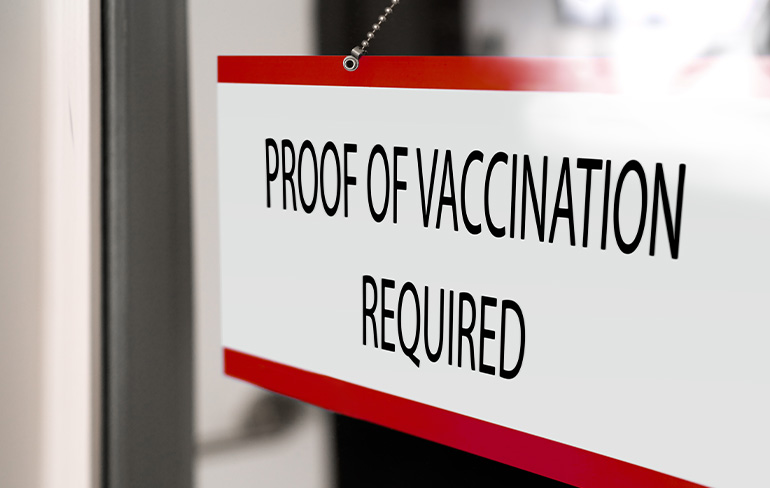Vaccine mandates are a hot topic at the moment after the Biden administration announced that all government employees are required to receive the COVID-19 vaccine. Medcom wanted to take some time to discuss a few critical details about mandates as they relate to employers and potential religious exemptions for employees. Earlier this week, Michelle Barki, our Senior Legal Counsel, presented a webinar on this topic. The webinar is available by clicking this link: View Vaccine Webinar.
What is a Religious Exemption?
Title VII of the Civil Rights Act prohibits employment discrimination based on race, color, religion, sex, and national origin. The rule means employers must provide exemptions and accommodations for employees who object to rules and mandates based on sincerely held religious beliefs. The employer should provide the accommodation unless it imposes an undue hardship on the business.
What is a Deeply Held Religious Belief?
If employers wish to place a mandate for employee vaccinations, they must consider their employees' religious concerns. If an employee refuses the mandate and claims it violates their religious beliefs, the employer has to confirm their beliefs are "sincerely held." The Courts say a sincerely held religious belief meets the following criteria:
- Not limited to recognized religious groups, churches, or denominations
- Includes traditional organized religions such as Judaism, Christianity, Hinduism, Islam, Etc.
- Also includes new, uncommon, informal beliefs subscribed to by small groups of people
- Does not require a belief in God or higher power
- May include theistic, non-theistic, moral, and ethical beliefs – what is right and wrong
According to the Courts, religion is comprehensive and based on a belief system, not isolated teaching. Therefore, a person's belief, observance, or practice can be religious even if affiliated with a group that does not hold the same position. However, Title VII states that social, political, economic philosophies or personal preferences are NOT religiously based and therefore not protected.
As it relates to vaccine mandates, employers must remember that religion is broadly defined for purposes of Title VII. For instance, the presence of a deity or higher power is not required, and the belief system may seem logical or be widely accepted. Still, employers should focus less on the nature of the religion and more on the individual's motivation or reason for maintaining the belief. For example, anti-vaccination stances may result from religious beliefs but are also motivated by fear of health effects, suspicion around the science, or personal preference. These reasons are not religiously motivated.
How Can an Employer Know?
Challenging an employee's motivation is tricky. Employers must exercise caution disputing these claims. Employers can request a few things from the employee if there is a question about the sincerity of their beliefs.
- Statements and explanations from employees describing nature and tenets of asserted beliefs and details on how they follow the practice or belief
- Written religious materials describing the religious belief or practice
- Written statements or other documents from third parties, such as religious leaders, fellow adherents, family, friends, neighbors, coworkers, or others who observed employee’s past adherence to the belief or discussed it with them
The EEOC recommends that unless the employer has an objective bias for questioning the religious nature or sincerity of the observance, they should presume the request is legitimate. However, some signs for employers to watch for are:
- The employee behaved in a manner inconsistent with the professed belief.
- The accommodation sought is particularly desirable and potentially sought for secular reasons.
- The timing of the request renders it suspect, e.g., it follows earlier requests by the employee for the same benefit.
Where Do We Go From Here?
In the past, employers gave employees the benefit of the doubt. They likely approved requests for religious exemptions with few or no questions asked. However, now we face an increased amount of exemption claims due to the COVID-19 Pandemic. Recent vaccine mandates, and laws against mandates, challenge employers to adopt policies that prevent the misuse of the exemption. Employers also must find a way to be sensitive to their employees and respect their beliefs. The whole process can be troubling.
If the employer feels confident they can prove the employee's belief is insincere, they can enforce the mandate and proceed with adverse action if the team member does not comply. Medcom suggests, however, reaching out to your legal counsel for advice before taking this step. We want the employers and employees protected as much as possible, and seeking counsel is the best first step.
Medcom Benefit Solutions provides partner and employer training on vaccine mandates and legislation relating to COVID-19. We also have customized training available for all our divisions, including ACA, COBRA, Health & Welfare Compliance, and HIPAA. Please CONTACT US to see what training options we can provide for your teams and clients.





